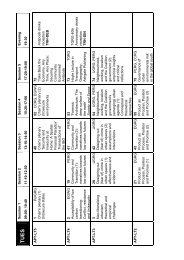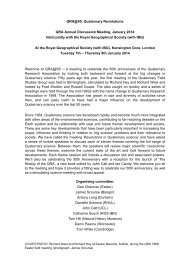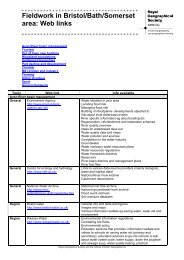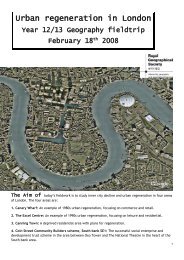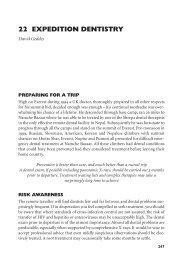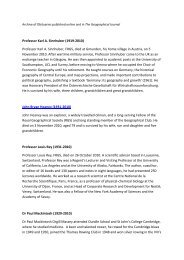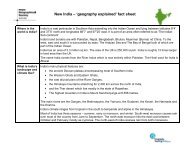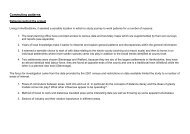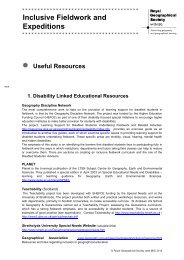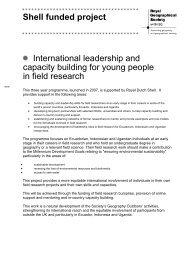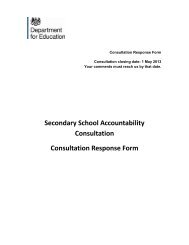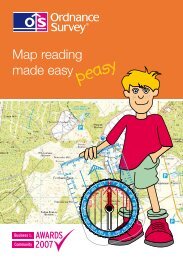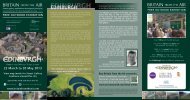foot and mouth disease interview (PDF) - Royal Geographical Society
foot and mouth disease interview (PDF) - Royal Geographical Society
foot and mouth disease interview (PDF) - Royal Geographical Society
You also want an ePaper? Increase the reach of your titles
YUMPU automatically turns print PDFs into web optimized ePapers that Google loves.
4. Are we still feeling the impacts of the outbreaks today?<br />
Ask the Experts<br />
The 2001 <strong>and</strong> 2007 outbreaks were not merely costly <strong>and</strong> damaging economically <strong>and</strong> socially; they also<br />
marked a turning point in public attitudes to food production <strong>and</strong> have led to changes in Government<br />
policy. Combined with Independent Reviews of the Government’s response to the outbreaks carried out<br />
by Sir Iain Anderson <strong>and</strong> The <strong>Royal</strong> <strong>Society</strong> (which made a series of recommendations in the event of any<br />
future outbreaks) the 2001 <strong>and</strong> 2007 outbreaks continues to shape the way in which livestock keepers<br />
farm each <strong>and</strong> every day.<br />
Firstly, the outbreaks have led to improved contingency planning <strong>and</strong> preparedness. The Department for<br />
Environment, Food <strong>and</strong> Rural Affairs (Defra), for example, has a ‘Framework Response Plan’ setting out the<br />
roles, responsibilities <strong>and</strong> procedures that should be put in place to manage an ‘exotic <strong>disease</strong> outbreak’<br />
the moment there is a suspected case of <strong>disease</strong>. The FRP is regularly revised <strong>and</strong> subject to public<br />
consultation prior to being laid before Parliament each year. Most recently, the FRP was used to prepare<br />
for an outbreak of Avian Influenza.<br />
Secondly, the outbreaks led to the implementation of a series of biosecurity measures – these are a set of<br />
practices which, when followed collectively, reduce the potential for the introduction or spread of animal<br />
<strong>disease</strong> onto <strong>and</strong> between farms. During FMD <strong>and</strong> in the event of further outbreaks, Defra advises that<br />
farmers keep species of livestock separate where possible; be aware that sheep do not always show<br />
obvious signs of <strong>disease</strong> but could inadvertently infect other animals; to keep everything clean (e.g. boots,<br />
clothing, equipment, vehicles); <strong>and</strong> to ensure that disinfectant <strong>and</strong> cleaning materials are used at farm<br />
entrances <strong>and</strong> exits.<br />
Thirdly, traceability <strong>and</strong> providing a clearer picture of when <strong>and</strong> where livestock are moved <strong>and</strong> physically<br />
located, through the use of bar codes, animal passports <strong>and</strong> ear tags has come into force. In September<br />
1998, the Government launched a computerised Cattle Tracing System (CTS) to record the movements of<br />
cattle from birth to death. CTS logs the movements of all cattle born or imported into Britain <strong>and</strong> issues<br />
them with individual cattle passports. Electronic Identification (EID) for sheep came into force in 2009 <strong>and</strong><br />
means that sheep born on or after 31 December 2009 must now be electronically identified (unless they<br />
are going to be slaughtered within 12 months of age). Pigs also need to be registered with Defra <strong>and</strong> a<br />
movement licence completed before they are moved off a holding. These systems make it possible for<br />
Defra to trace animals exposed to a <strong>disease</strong> risk <strong>and</strong> give assurances to buyers <strong>and</strong> the public about an<br />
animal’s life history.<br />
Fourthly, the outbreaks have led to new ways of thinking about how <strong>disease</strong> outbreaks are funded. Defra<br />
currently spends £330 million each year on animal health <strong>and</strong> has to meet the additional costs of any<br />
<strong>disease</strong> outbreaks in Engl<strong>and</strong>, Scotl<strong>and</strong> <strong>and</strong> Wales. The Coalition Government is currently developing<br />
proposals to share the costs for dealing with <strong>disease</strong> with animal keepers. The Government has<br />
established a ‘Responsibility <strong>and</strong> Cost Sharing Advisory Group’ to develop these proposals by December<br />
2010 (they could include requiring animal keepers to take out insurance for example). In June 2010, Defra



